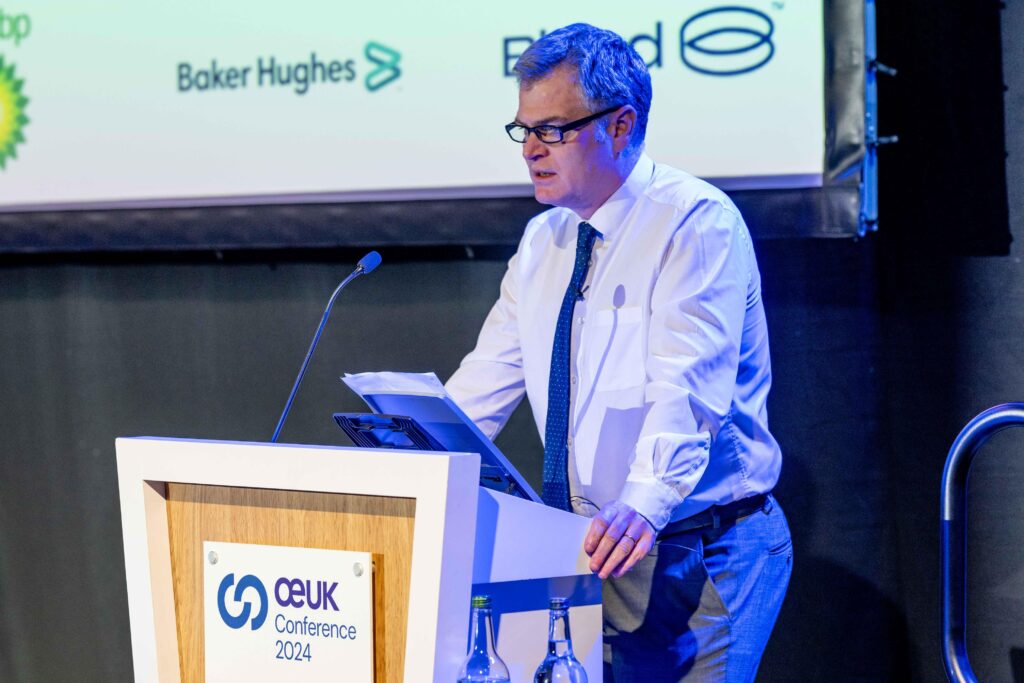
OEUK CEO David Whitehouse, OEUK Conference speech 2024
Welcome everyone to OEUK’s Annual Conference and again thank you to our sponsors and to our excellent speaks that we’re going to hear from today. Thank you.
Over the years, this conference has provided the sector with a vital platform to discuss key issues.
From ensuring energy supplies during Covid-19, weathering economic downturns, tackling the cost-of-living crisis, to tackling climate change – we, as your representative body, have acted as a voice for you – the companies and people that make up this sector.
And now I stand before you as we face another challenge – the matter of our energy future.
Ten weeks ago, we welcomed a new UK Government. We welcomed the focus on economic growth. We welcomed the focus on turning the energy transition into an opportunity for the country.
I welcomed, personally, the commitment from our new Energy Secretary and our new Chancellor to working in partnership with the sector.
We welcomed the commitment to engagement. And thank you Energy Minister. You have engaged.
Thank you. As we all know, it is ultimately policy decisions that will matter.
The decisions made by governments in the days, weeks and months to come will have consequences for the future of our energy landscape, consequences for the future of our country.
The decisions made will have a direct impact for communities here in Aberdeen, across Scotland and across the entire UK.
Delivering secure and low-cost energy sits at the very foundation of good government. Energy strategy must outlast this election cycle, and the next, and the next. It is the lifeblood of our nation, powering homes, businesses, and industries.
We need our governments working together. So, I am delighted to see with us today the minister for climate change (action)? from the Scottish Government.
We need long term planning and stability. We need collaboration between governments and industry and the workforce.
The UK has an opportunity to be a true energy world leader.
But a starting point must be an industrial strategy built on partnership, that leverages our industrial strengths, recognises that the journey to net zero is vital but will take time, puts innovation and technology at its heart, and ensures the UK is globally attractive for the energy investment we need.
We should be proud of our industrial strengths – of our heritage. We should leverage those strengths.
This sector today supports the jobs of over 200,000 people from the North of the country all the way down to the South.
Those are 200,000 very real livelihoods that rely on the work of our operations.
The UK is blessed with abundant natural resources.
Our powerful winds, sweeping across our coasts, offer tremendous potential for renewable energy.
Beneath our seas lies a wealth of untapped resources, resources that have powered our nation for decades and can continue to do so as we transition to a sustainable energy mix.
I have been proud to work in the sector for the over 30 years. North Sea experience is a badge of honour for all of us globally, opening doors for our people and companies across the world.
We have embraced the challenges and opportunities of the energy transition.
Oil and gas companies have managed to reduce emissions from production by 28% since 2018, four years ahead of schedule. We have cut methane emissions by 50% in that time too.
There is work to do, there are long term targets we must achieve, and no-one can be complacent. But our emissions report released today shows an industry in action.
The UK could store over 70 gigatons of carbon dioxide, more CO2 than the UK has produced since the industrial revolution. We stand on the brink of final investment decisions on critical carbon storage projects – our challenge is to unlock together the wider opportunity at pace.
The first commercial scale floating offshore windfarm in Europe will be delivered by one of our members, providing power to offshore oil platforms and the national grid.
The North Sea, its people, skills, and companies, are a strength and remain a vital part of our energy ecosystem. Our world class supply chain companies use the revenue from oil and gas activity to invest in our energy future. A homegrown energy future.
But that ecosystem, as we have made clear, is under threat.
With four tax changes in the last two years, the UK has become an increasingly challenging place to do energy business.
Offshore projects have long and arduous pipelines, with planning and consenting processes that can take years to come to fruition.
We need regulators to work with industry to make approval processes robust, efficient, transparent, and predictable, and yes – to hold us to account. I am pleased we are joined by Stuart Payne of the NSTA.
This is an industry that requires stability and supportive policy to make the massive investment decisions necessary to secure our energy future.
There is an important role for public investment in our energy transition, and the sector stands ready to make GB Energy a success.
But the journey to net zero will require an estimated £1.4 trillion of investment in the UK by 2050, and the lion’s share of that will come from the private sector. We need the UK to be the place of energy investment.
UK offshore energy companies alone could invest £200 billion in homegrown energy production this decade. But without a clear path to return on investment and unstable fiscal regimes, we risk driving away the very businesses we need.
The innovative technologies that will drive our energy future – floating wind, carbon capture and storage, hydrogen production – are not born of thin air.
Those technologies are the result of decades of expertise, engineering skill, and dedication of the people within this existing offshore energy industry.
Our engineers, our technicians, our divers.
Our manufacturers, safety advisers, our policy experts.
Our investors, our pioneers, our dreamers.
These technologies are the result of every one of us in this room right now. The very people needed for our energy future.
By supporting this sector today, by leveraging our own resources, we can ensure a healthy project pipeline for tomorrow, growing our UK supply chain capability and capacity. On this journey, we must grow our world class supply chain.
But if we lose that business today, we risk losing that opportunity.
It has not gone unnoticed that while we engage in frank discussions to prevent policy decisions jeopardising jobs in the oil and gas sector, Governments are working to save important jobs at the Grangemouth refinery and supporting jobs in primary steel manufacturing in the country.
The challenges are evident, but on our decarbonisation journey, there will be no prizes for de-industrialisation that makes the country poorer and increasingly dependent on imports.
Decisions made by this government in the coming weeks will be felt for decades to come. We can choose to ensure continued investment in the oil and gas that we need, protect jobs, support our world class supply chain to deliver a homegrown energy transition. Or we can choose another path – to rely more and more on imports for our energy.
The energy transition will not wait for us. Investors will simply take their capital to other basins around the world. We cannot let that happen.
But this is not just about energy, it is about our economic security, our environmental responsibility, and our national sovereignty. It is about ensuring that the UK remains a leader, not a follower.
It is also about communities.
A successful energy transition must be done with people not to them.
So today, let us be proud of our contribution. Let us recognise the opportunity that lies ahead for us all.
Let us use this conference to make the case for this extraordinary sector and make the case for prioritising a homegrown energy future over an imported one.
In important times we must all speak up.
Thank you.
Share this article



